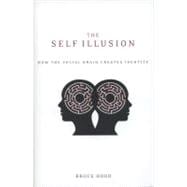
| Prologue: The Reflected Self | p. vii |
| The Most Wondrous Organ | p. 1 |
| The Machiavellian Baby | p. 34 |
| The Looking Glass Self | p. 71 |
| The Cost of Free Will | p. 116 |
| Why Our Choices Are Not Our Own | p. 254 |
| How the Tribe Made Me | p. 184 |
| The Stories We Live By | p. 220 |
| Caught in the Web | p. 249 |
| Why You Can't See Your Self in Reflection | p. 289 |
| Notes | p. 297 |
| Acknowledgments | p. 342 |
| Index | p. 345 |
| Table of Contents provided by Ingram. All Rights Reserved. |
The New copy of this book will include any supplemental materials advertised. Please check the title of the book to determine if it should include any access cards, study guides, lab manuals, CDs, etc.
The Used, Rental and eBook copies of this book are not guaranteed to include any supplemental materials. Typically, only the book itself is included. This is true even if the title states it includes any access cards, study guides, lab manuals, CDs, etc.